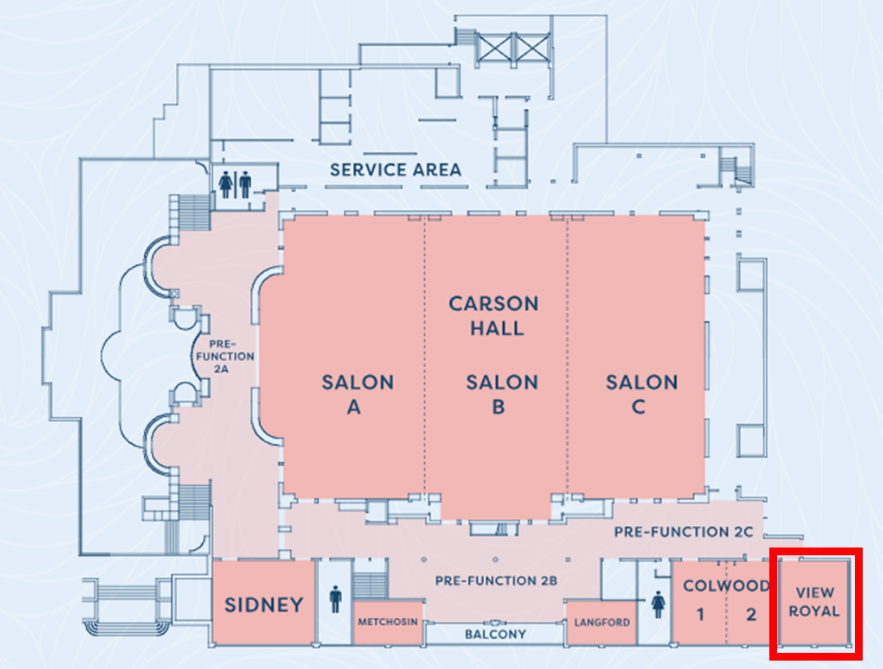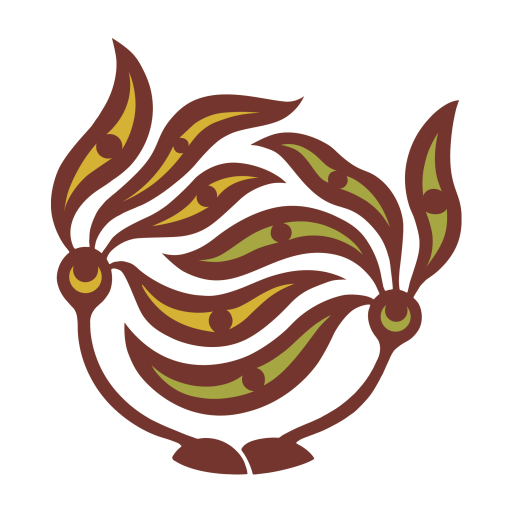Indigenous Participation
Indigenous Participation
We are excited to welcome Indigenous Participants from around the world including: Canada, Australia, Hawaii, Solomon Island and so many more!
The Indigenous Engagement Committee has formed an Indigenous Advisory Committee to help guide the organization of the symposium to ensure that Indigenous participants can engage with the conference in a meaningful and safe manner.
Important information about the symposium:
Dedicated Quiet Room
There is a dedicated quiet room (View Royal) that Indigenous participants can use throughout the conference as a space for quiet or networking. See map for location of the View Royal room on the second floor of the VCC.

Indigenous Social Event
Please join us for an evening social for Indigenous peoples and those representing Indigenous organizations to come together, share a meal, and have time to get to know each other and share a love of all things seaweed! Food is being supplied by the Songhees Catering Services!
This is a registered event (at no cost). Registration Link available soon!
When: Monday May 5 6:30-9:00 pm (Door open at 6)
Where: Sunset Labs Victoria
Who: All Indigenous delegates and people representing Indigenous organizations
What: Food! Conversation! Connection!
International Indigenous Participation
We are thrilled about the international participation at this conference. Please stop by the Indigenous Quiet Room (View Royal room) at the VCC to include either your place of origin or where you are doing your work. We will be posting a photo of all our pins on the website and conference social media!
List of Indigenous Talks and workshops
Plenary Session II
Time: 8:30 AM – 9:30 AM
Location: Salon BC
Speaker: Chief Abraham Pelkey
Advancing sustainable seaweed food systems through traditional knowledge sharing
Time: 11:00 AM – 1:00 PM
Sponsored by: University of the Sunshine Coast
Six Indo-Pacific speakers will be supported by IDRC AQUADAPT Program after mini-symposium acceptance. They will showcase shared seaweed presentations from Samoa and Kiribati, Indonesia and Solomon Islands, and Malaysia and Philippines. We encourage broader abstracts offering examples of knowledge sharing through an open abstract call on the ISS website before October 8th. Abstract: Seaweed has long been used by Indo-Pacific saltwater people, for a range of purposes including food, medicine, traditional crafts and utensils, shelter, art, and ceremonial purposes. More recently, modern science has prioritised functional capabilities of seaweed, investigating their potential for human health and environmental benefits. This mini-symposium brings together scientists and saltwater people in a format of shared seaweed presentations. We will highlight the value of two perspectives working hand in hand, showcasing exemplary approaches to seaweed knowledge sharing and impactful benefits achieved. Under the guiding principle of two-eyed seeing, the objective of this mini-symposium is to draw attention to the value of seaweed through the strengths of traditional ways of knowing and doing, alongside the strengths of modern science. This commitment to reciprocity and mutual learning is critical to moving forward together in achieving sustainable agri-food systems and meeting the Sustainable Development Goals, whilst advancing decolonisation, reconciliation and Indigenous rights. This session will showcase a variety of methodological approaches that are culturally safe and aware, embracing respectful and reciprocal knowledge sharing. The mini-symposium welcomes contributions on topics including, but not limited to: - Valuing knowledge of seaweed as a traditional food, with opportunities to contribute to food security and livelihoods. - Equity and social inclusion in developing seaweed industries. - Principles for guiding research and practice in seaweed food systems. - Lessons from collaborative approaches that integrate diverse ways of knowing.
The Indigenous Seaweed Revolution: Building a Collective and Navigating Toward Abundance
Time: 11:00 AM – 1:00 PM
Sponsored By: Hokkaido University, Graduate School of Environmental Science
Indigenous leadership is critical to a thriving planet—especially one with abundant seaweed at the foundation of social-ecological systems. Yet, there remain challenges to navigating and confronting modern systems of settler-colonialism as they apply to (commercial) seaweed cultivation. We are at an inflection point with Indigenous science and Traditional Ecological Knowledge increasingly being integrated into otherwise Eurocentric systems, including in applied phycology. However, it is critical to ensure that this epistemological revolution continues to navigate toward abundant (social-ecological) futures for Indigenous peoples and seaweeds themselves. Discussions at and since ISS24 have highlighted the need for an international Indigenous seaweed collective. Toward that goal, this mini-symposia will highlight presentations from Indigenous scientists, stewards, and business leaders working on applied seaweed topics to showcase success stories, recommendations, and concerns relevant to all working in the broader seaweed industry. Presenters will address themes such as: (1) Best practices for centering Indigenous peoples, places, and values in commercial seaweed industries, (2) Indigenous perspectives on the potential and limits of cultivating seaweed for carbon credits, (3) “Parachute” seaweed science and industry: listening to community concerns of extractive relationships, (4) Establishing global/local Indigenous networks for collaborative seaweed and aquaculture stewardship, and (5) Adopting standards for mutually-beneficial relationships between researchers/industry and Indigenous communities. This mini-symposium aims to build global Indigenous relationships for knowledge sharing and best practices for navigating colonial systems and partnerships. We also invite a broad audience to learn from these Indigenous leaders and engage in a fruitful discussion on how Indigenous allies can support the Indigenous seaweed revolution.
Advancing sustainable seaweed food systems through traditional knowledge sharing
Time: 11:00 AM – 1:00 PM
Sponsored by: University of the Sunshine Coast
Feedback
The National Organizing Committee is keen to understand how the conference went from the perspective of Indigenous attendees. We will be organizing a feedback session at end of the conference with an online option for people as well. Any feedback we receive will be put into a report and shared with the National Organizing Committee for the 2028 meeting.
Indigenous Engagement Committee
Maycira Costa – University of Victoria – conference co-chair
Kylee Pawluk – Province of BC
Pieter Romer – Oceans Network Canada
Hannah Kosichek – Oceans Network Canada
Jennifer Claxton – Sⱦáutw̱ First Nation
Indigenous Advisory Committee
Thank you to everyone who participated in our Indigenous Advisory Committee to make this a safe and welcoming conference for all Indigenous peoples!
ISS25 Important Dates



